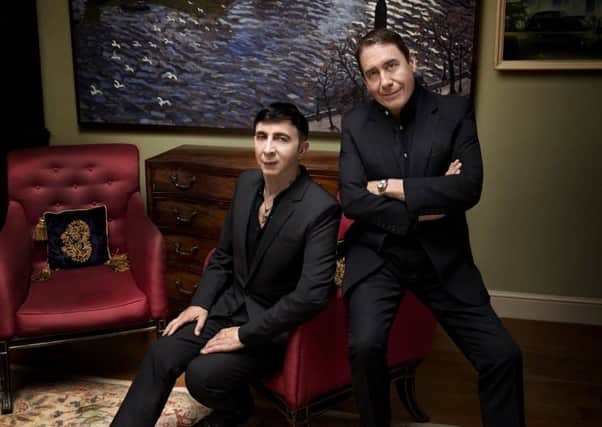Album reviews: Jools Holland & Marc Almond | Mumford & Sons | Mark Knopfler | The Eastern Swell


The Jools Holland juggernaut trucks on with an uncharacteristically jaunty Marc Almond in tow on A Lovely Life To Live, a product of their sporadic collaboration over the last ten years and, to a degree, their tribute to shared experience on the London music scene in the early 1980s.
A couple of originals celebrate that shared heritage. I Lost My City is prime chanson territory for Almond, as he drifts by the dusty old haunts against a dramatic big band backdrop. Next, he gets his strut on to salute that bygone nightlife on London You Were My Lover, though one senses Almond could capture the decadence without the blast of Holland’s rollicking Rhythm & Blues Orchestra behind him.
Advertisement
Hide AdElsewhere, there is an overblown take on Edith Piaf’s Hymne A L’amour, while Almond submits to the cheesy finger-clicking swing of Dirk Bogarde and Me. The same big band treatment is meted out to Tainted Love to the detriment of the sentiment.
Almond relishes these jazz hands moments but is more suited to an intimate torch song delivery. However, he and Holland find their ideal crossover point covering two Bobby “Blue” Bland numbers, digging in the dirt of It’s My Life Baby and unleashing the sheer sass of I’ll Take Care of You.
There is not much new to report in Mumford & Sons’ world but another album inspired, they say, by “death, divorce and depression”. Down in the Thames Delta, the blues takes the form of introverted nonentities such as Woman. The minimalism of The Wild is better, building to a swirling string crescendo and inhabiting the self-involved sensitive-guy territory of their onetime peers Noah and the Whale.
In collaboration with producer Paul Epworth, they have slightly varied the musical palette for their fourth album, experimenting mildly with elements of orchestration, electronica and distorting effects, none of which particularly invigorates the songwriting. Rose of Sharon is passionate lyrical declaration of love with a curiously dispassionate soundtrack and, from here, Marcus Mumford appears caught up in the rapture in his own polite way, finding its most satisfying expression in Wild Heart with its rhetorical poser “who wants a love that makes sense anyway?”
Mark Knopfler is in typically low-key form on Down the Road Wherever which meanders meditatively over 75 minutes from the mellow rhythm’n’blues of Back On The Dance Floor to the bright Tijuana Brass-style sashay Heavy Up.
John McCusker’s fiddle and Michael McGoldrick’s whistles add a plaintive backdrop to the crumpled but sincere empathy of Drovers’ Road and Knopfler recalls his hitchhiking musician days in the gentle bluegrass terms of Matchstick Man.
Advertisement
Hide AdJust a Boy Away From Home is an impish tale inspired by his father’s memory of a Liverpool fan wandering the streets of Newcastle singing You’ll Never Walk Alone. Knopfler picks out the tune on his guitar in a moment of levity but the highlights of an understated collection are two cocktail lounge laments, Slow Learner and When You Leave, with Knopfler invoking the spirit of Jacques Brel as a devastated, desiccated soul soundtracked by Tom Walsh’s keening jazz trumpet.
Edinburgh’s The Eastern Swell follow up their immersive debut One Day, A Flood in similarly timeless and seamless style, embellishing the psych folk and prog rock of opening track Miles From Home with a bright horn break straight out of the Burt Bacharach songbook, applying western swing fiddle and trad jazz trumpet to the scurry of Zeitgeist and offering a sensitive psychedelic reading of folk standard Blackwaterside, which showcases Chris Reeve’s guitar playing as much as Lainie Urquhart’s storytelling. - Fiona Shepherd
CLASSICAL
Advertisement
Hide AdBeethoven: Sonatas for Violin and Piano, Vol 3 (Rubicon) *****
For this third volume in their series of Beethoven’s violin sonatas, Chloë Hanslip (violin) and Danny Driver (piano) tackle two of the A major sonatas, Op 12 No2 & Op 47, and the G major Sonata, Op 96. The first two frame the latter in a manner suggestive of sonata form itself. The first thing to note is the ravishing symbiosis of these two musicians, Driver’s solidly expressive pianism both independently resolute and responsive to Hanslip’s intelligently passionate violin playing. The opening A major sonata is beautifully eloquent, its almost skittish opening movement complemented by the simple logic of the ensuing Andante and Allegro. The later G major, with its breezy countenance, and a softly probing slow movement melody, takes us usefully to the second A major work, the famous Kreuzer Sonata. The performance ignites every facet of the piece: its fiery drama, impetuosity, intimacy, and the virtuosity of the presto finale. - Ken Walton
JAZZ
Jessica Radcliffe: Remembrance (Ubuntu Music) ****
From the gently sung Last Post that opens it, vocalist Jessica Radcliffe’s contribution to the recent Armistice commemorations is an often extraordinary exercise, and while one might grumble at the degree of spoken rather than sung material, the album is infused with pathos, righteous anger and musicality, not least due to a fine band including pianist Sam James, trumpeter Tom Dennis and Mark Lockheart guesting on tenor sax and bass clarinet. Here
is Wilfred Owen’s Dulce et Decorum Est as you’ve never heard it, inexorably driven by marching piano and thick with outrage. The stop-start nature of Over the Top, with its pell-mell rush interrupted by the quiet of prayer and a sarcastic Eton Boating Song, doesn’t quite hold together,
but there’s real tenderness to her singing of Lawrence Binyon’s For
the Fallen and When They Ask Us, while powerful trumpet and Joe Downard’s thoughtful bass work distinguish a setting of Ivor Gurney’s By a Bierside. - Jim Gilchrist